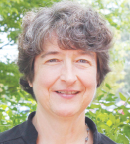THE FIRST full year of educational training in the practice of complementary therapies is now underway at the University of Michigan in Ann Arbor through its Integrative Oncology Scholars Program, which launched in 2017. The program, which is supported through a 5-year grant from the National Cancer Institute, aims to teach 100 oncology providers how to evaluate the scientific evidence of the efficacy of complementary therapies, such as acupuncture, yoga, meditation, physical activity, and nutrition, to relieve the common side effects of cancer and its treatment. The inaugural program, which got underway this past August and will end in July 2019, has enrolled 25 oncology professionals from a variety of disciplines, including 10 physicians from the fields of radiation, medical, and surgical oncology as well as primary care, dermatology, and palliative care; 5 advanced nurse practitioners; 5 social workers; 3 physician assistants; 1 pharmacist; and 1 physical therapist. These professionals represent 23 health-care systems in 13 states and the District of Columbia.
The year-long program, which is offered free of charge to eligible oncology professionals, entails completing 72 in-person hours occurring over a Friday, Saturday, and Sunday at the University of Michigan and 5 hours per month of Internet-based coursework, for a total of about 132 hours. During the program, participants will be required to develop and complete a capstone project detailing how to fill significant gaps in the education, clinical practice, or research of integrative oncology practices in collaboration with the participants’ home institutions and with guidance from Integrative Oncology Scholars Program mentors.
Each participant accepted into the program receives a $1,500 stipend for travel and lodging expenses to attend the in-person sessions and 24 continuing medical education (CME) credits upon completion of the program.
Course Curriculum
THE INTEGRATIVE Oncology Scholars Program curriculum uses a flipped classroom model in which participants are required to complete two Web-based e-Learning interactive modules each in-person day. The modules cover general integrative medicine treatment that addresses a cancer-related symptom, such as pain, nausea, fatigue, depression, anxiety, and sexual dysfunction, and corresponds to the in-person classroom sessions. Included in this year’s e-Learning module is a course on the medical use of cannabis in cancer care, dietary supplements and drug-supplement interaction, and mind-body movement therapies and how to apply the information in clinical practice.

“Our ultimate goal for the Integrative Oncology Scholars Program is to impact the dissemination of evidence-based knowledge about complementary medicine throughout clinical practice, education, and research.”— Suzanna M. Zick, ND, MPH
Tweet this quote
At the completion of the program, the participants are assessed for the knowledge they have gained in evaluating the scientific evidence of complementary therapies used by cancer survivors; facilitating the integration of evidence-based complementary therapies into oncology care; and partnering with community-based integrative medicine practitioners to reduce the symptom burden and improve patients’ quality of life.
“Our ultimate goal for the Integrative Oncology Scholars Program is to impact the dissemination of evidence-based knowledge about complementary medicine throughout clinical practice, education, and research,” said Suzanna M. Zick, ND, MPH, Program Director of the Integrative Oncology Scholars Program and Co-Director of Integrative Family Medicine and Research Associate Professor at the University of Michigan Medical School. “We want our scholars to think about how they can use their training to improve the lives of patients with cancer, their friends, and families.”
The 2019–2020 Integrative Oncology Scholars Program will begin in August 2019 and end in July 2020. To learn more about the program, visit https://sites.google.com/umich.edu/ ioscholars. ■

